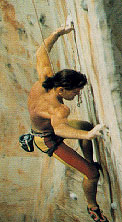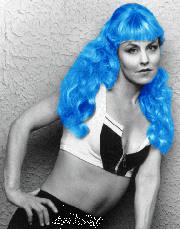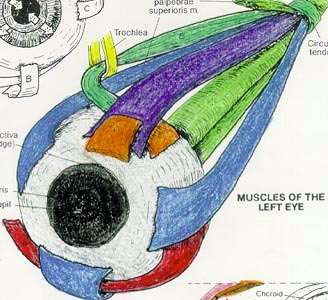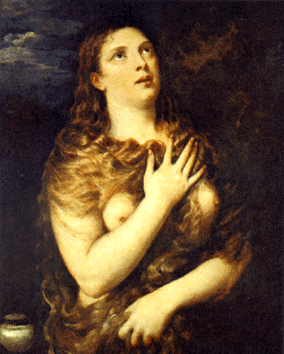Feminism and the Body
In twentieth century literature, not only are more writers female but even male writers describe and explore the female body in new ways. For centuries the structure, rhythm and dynamics of literature has been male but in this century we see more variety. Or do we?
Virginia Woolf developed a complex syntax and voluptuous phrasing which she considered to be "feminine;"but is it sexist to say that is how women should write when so many late twentieth century female writers write directly and aggressively? How much is biological and how much a part of our society? Does Virginia Woolf live in her sexuality or is she just a brain in a room of its own?
How does the smoldering, frustrated, forbidden sexuality of Red Azalea enhance the theme and message of self against communist state? How does Maoism actually liberate the woman as man's equal while denying her true sexuality? How does the Mao woman differ from America's cosmetic woman?
How does El Sadaawi's dessicated post-cliterectomy woman mesh with the dry, baked landscape of the Middle East?
How does Arundhati's sexual joy provide an oasis in the tumultuous, violent world of mid-century India?
James Joyce captures the language of Molly Bloom's soliloquy and the realistic and provocative images of her stream of consciousness, but it's ironical that he will describe every part of her body graphically, including her anus, but always avoiding her clitoris, as if it did not exist. Maybe the Anglo-European woman didn't need a clitorectomy. The rising climax of the monologue also mimics the male rather than the female orgasm.
What do novels smell like? For me Virginia Woolf's books smell like expensive cologne and musty old library books; John Updike's work stinks like an old man who has hiked too long in unwashed clothes; El Sadaawi's work smells like fresh blood, Anchee Min's like salt, and Joyce's like liquor, semen and flowers. How do these novels and plays smell to you? The body's image doesn't smell....
The Body's Image
Why are the symbols of femininity breasts and hair when the organs of ecstasy are the clitoris and the vagina?
How do contemporary images of the female body permeate the literature?


How much is our concept of beauty dictated by cultural conformity?
Supermodels are rewarded with higher incomes than educators, therapists, artists,
bodies in the workplace, almost everyone.
Does our culture worship the body or the image of the body? What is the difference?![]()
How does obsession with the body's image distort the potential of the
mindbody itself?
Do wars occur because people look into the mirror and can't agree upon the
image?![]() If body parts are
worshipped individually, why do we have a corpse when we dissect them?
If body parts are
worshipped individually, why do we have a corpse when we dissect them? ![]()
Do you like what you see in the mirror?
Have you ever played with your image?

How much psychological damage is done to people whose image does not
conform to the cultural norm?
How much medical damage is done by fashion over the years? (high heels, tight
corsets, plastic surgery etc.)
How much of character transformation in fiction is achieved through a change
in body image?
If you could look like anyone, who would it be? Why?
Student Albert Lung analyses the striptease: "For Roland Barthe, the art of shedding clothes is a French bourgeoisie myth replete with poetic and literary traditions, as well as a national sport which occasionally delivers magic. But more interesting is the clumsiness of a non-professional stripper--those well-educated and moralizing ladies of the middle class whose lack of imagination and awkward gestures while trying to strip fascinates the spectators even more. This process of "de-sexualization," as Barthe terms it, provides the subtext of French culture and p�litics.
Of course in America striptease is a commercial transaction-- a symbolic
act of the "Hollywood narcissism," which is today monopolized by millionaires
like Demi Moore or Michelle Pfeiffer. Sadly one has to muddle through some
afternoon junk shows like Ricki Lake or Oprah to see a fat and ugly woman
strip for the glory of being a pure object of sex. Such courage requires a
self-indulgence which transcends a woman's self-consciousness and interpretation
of beauty; it is a self-imposed discipline beyond any sexual innuendo. Striptease
is inherently a democratic act which perhaps originated from the Greek ideal
of the perfect body. Today it is an individual expression of his or her hunger
for exposure and feedback for it is the stripper who possess the right to
communicate and freedom of speech, whether in real life or through the video
camera."
Student Michael Gatling captures what happens to the reflection of the body
in water in this image:

and more...Mutilation 
Female mutilation has existed for 4000 years and is still practiced all over the world in 1998, even in New York city. Sexual pleasure is destroyed; and some women are maimed, incapacitated or even killed if they bleed to death or have a heart attack. Student Kerry Ann Bastan (Fall, 1996) did extensive research on clitorectomies, even finding a teenage "cut" woman in her building to interview. She imagines two different points of view of the event:
"Imagine: on the first day of your wedding, your clitoris is knifed out of you; and the next day, before your vagina has had any time to heal, you are having a penis pushed in you. A welcome to motherhood!? If a girl reaches her late teens without being married the ceremony is often performed anyway, and when a younger brother needs to be circumcised to enter the warrior class, his elder sister must have her genitals cut first. This mutilation is not only controlled by, but centered around, the male....In the Horn of Africa, the most severe and harmful form of cutting, infibulation, is practiced. In this particular mehtod, the clitoris and some or all of the small genitalia is cut away. Then an incision is made in the large lips so the raw surfaces can be stitched together, covering the urethra and most of the vagina. Only a small opening, as tiny as a matchstick or as large as a small fingertip, is left to pass urine and menstrual blood."
Kerry then takes the opposite point of view to better understand the values of a different culture:"Mikira, a young woman, who lives in Ivory Coast, Africa, is to enter womanhood tomorrow via an intense, religious and momentous ceremony that honors her as a woman and an important member of the community. There is a strong bond that holds this community together, a feeling of being part of something more important and powerful than oneself. All Mikira has to do is give up a small part of her clitoris, just a little nick to honor her God and her people. Many would say that this is not, on a relative basis, too much to give. Nobody would say that it is no small thing to sacrifice a part of a woman's sexuality, but mos� would say it is well worth it to be a clean woman. Mikira is so excited because she is finally going to grow up tomorrow. She has been waiting her whole life for this. She knows what's going on. She is to join her mother and grandmother and great grandmother and their wonderful world of womanhood in a tradition that has sustained these African cultures for thousands of years. She knows she will endure pain, just as her husband will in his own way, such as in protecting the home, fighting for survival.
The only function for a clitoris is pleasure: it has no functional role. As a good citizen, Mikira knows a woman's role in life is to care for her children, keep house and cook. This is best accomplished by reducing sex to a marital obligation. If she has not been cut, a woman might think instead about her own sexual pleasure. Clitorectomy is part of a girl's dreams of womanhood, a father's desire to show off with a big party and a family's way of proving its conformity to social convention. In these societies, women have no way to survive without a husband, and parents insist on the rite so their daughters are marriageable. Female mutilation controls teen-age girls' sexual appetite, wards off unwanted pregnancies and helps insure a woman's fidelity to her husband and family.... This diminishing of sexuality transcends into a greater good."
Always be ready to interview! Student Kerry Bastan was doing research on female circumcision when she found out that a fifteen year old girl in her building had had her clitoris removed by a doctor in the United States. The following are excerpts from the interview:
Q: What do you remember most?
A: "Wider. Wider. I said, Open wider. You keep trying to put your legs together,
it's not gonna work that way." That's what I remember most. Kind of strange,
it does make sense, after all. I still hear those words "open wider" screaming
in my ears three years later.
When I was 12, my father told my aunt that I had to have a female genital
cutting-- it was tradition: all his daughers had one, and so would I. I sort
of remember my aunt and uncle arguing about it, and I know there was talk
about me going back to Pakistan to have it done there. That way, it would
be more traditional, and I would get a ceremony. I remember I got excited
about having a ceremony, like a wedding here, and of wearing beautiful clothes
and beautiful jewelry, like my cousins did at their ceremony. My father did
send me a set of beautiful, real gold necklaces because I am a woman
now and can wear those gold necklaces. It was the most expensive present he
ever bought me, he said, and I should only wear them on special occasions,
like going to temple. [She is a Muslim.]
But no one ever told me what a female genital cutting really was. I think
they thought I was too young to understand. They did tell me that I was getting
too old to be uncut, and I needed to be cleaned in order to be a real woman,
like them. I still didn't understand what was happening when I went in for
the female genital cutting. Clitoris? What the heck is clitoris?I guess I
did equate it with having my tonsils taken out. I knew I wasn't going to the
doctors that day because something was wrong withme, but I thought the doctor
had to change something in me to be a woman.
Then the knife pierced my vagina. At first a slight poke, and then, suddenly,
it felt like an arrow ripping right through my body. I didn't know what the
doctor was doing, but I know I was scared, real scared. My grandmother was
there, holding one of my kicking legs down, and my aunt was keeping the other
one down. I wanted to die. As a small stream of blood trickled down my leg,
I knew the circumcision had been down. And, then, just like that-- one, two,
three, the doctor pulled out this little, sort of round, oval-shaped piece
of flesh. It reminded me of a soft acorn, one of those old brown ones that
had been lying under a tree for too long, squished flat, the result of too
many people stepping on it. I think this round piece of flesh was red underneath,
or maybe it was the blood covering it. I didn't know what it was. I vaguely
remember wondering if I did something wrong and I was being punished; I could
not imagine anything bad enough to deserve such a punishment. Like a basketball
player slam dunking a ball, the doctor then threw my piece of flesh in the
garbage and said: "Well, it's done. You did very well," and vanished behind
a stone-like door.
It was then that I noticed there was much more blood sweeping down my thighs,
different from my normal menstrual blood. I kept wanting to wake up from this
nightmare, you know, the kind that you can't wake up from. The blood kept
gliding down my legs while my grandmother was mumbling something about keeping
our tradition, and comparing this organ removal to a tonsilectomy. I looked
up and saw the knife-like apparatus the doctor used sitting in a container--
there was still some flesh on the knife. I don't remember anymore, I had fainted.
Since the cutting, my proud walk has become a shuffle; it takes me a quarter
of an hour to pee; my periods last ten days and I have cramps half the month.
But the scars run much deeper than what the knife cut.
Q:Do you have sensual or sexual feelings?
A: I don't know if I do. Most of my clitoris was removed, but the doctor told
me I might have sexual tendencies at times. I don't know. I don't feel anything.
My friends have sex, and they say they like it. I don't believe them. I like
to kiss guys... but no, I don't feel sexual, like they do in the movies.
In her research, Kerry discovered that these mutilations are very exciting to many men, particularly in Africa:
"Man is jealous of woman's [clitoral] pleasure because she does not require him to achieve it. When her outer sex is cut off, and she's left with only the smallest, inelastic opening through which to receive him, he can believe that it is only his penis that can reach her inner parts and give her what she craves. But it is only his lust for conquest that makes the effort worthwhile. To further please the man, after giving birth, women voluntarily go back to the excisor to be resewn, tighter than before. A proper woman must be cut and sewn to fit only her husband, whose pleasure depends on a very small opening. Men like it tight and fighting."
Kerry says that before we judge these people too harshly we should look at our own sexual practices.
"What about Catholic priests who cannot be married or Buddhist monks who give up, in addition to their sexuality, their tongues for a lifetime of quietness? What about so-called independent women who allow their boyfriends to beat them up or rape them? What about women who have tatoos painted all over their genital organs? What about women who wear high heels or worse, have their feet crushed and bound?"
Kerry is not afraid to look at the perverse yet interesting truth and boundaries of sexuality.
Could female circumcision be considered a kind of sex therapy for men, ensuring their potency through dominion and control over their bride whose stitches they cut open on their wedding night; and making sure their masculinity is not threatened by excessive sexual demands? How have different cultures encouraged or thwarted the sex drive? Compare the persecution of witches in the Middle Ages with the orgies of the Roman Empire. From Dr. Ruth to your average psychiatrist and impotency clinic, Americans have sought professional help to sort out a basic biological drive. Or is it a biological drive? Are some expectations of sexual performance cultural rather than biological? Why do people in our society have so many sexual problems and why are they are so worried about them? Do people feel inadequate when they cannot experience a never-ending feast of orgasmic delight? How can people feel good about their bodies when the cultural ideal for a good body is so unrealistic? i.e. for women: thin, lean and trim but with large firm round breasts (breasts are mainly fat); for men: tall, handsome, muscular, well-proportioned (what does that mean?) Anyway, if you look hard enough, you'll find something about yourself that is not considered "right." What does this do to one's sexual well-being? How has the threat of AIDS changed our concepts of what is sexy and appropriate and fun? How can healthy men and women be compatible with each other when their physiologic needs are so different? Is every satisfying sexual experience a compromise? How has your religious upbringing affected your sexuality? How many physical illnesses and conditions such as low back pain etc. are initiated or exacerbated by sexual frustration? If a character is sexually satisfied at the beginning of a fictional love story, where can the narrative go unless the loved one is lost, murdered or betrayed?
Feminism: An International Struggle
"Always be ready to interview!" Student Justine Donato (Fall, 1996) was struggling with her research comparing the views of American and French feminists on reproductive ownership of the body when she sat down on a plane beside Gloria Steinem. Ms. Steinem was kind enough to spend the flight writing down her ideas on the subject: 'I found that on the issue of abortion especially, U.S. and French feminists shared an understanding of the desire to control reproduction as the basis of patriarchy. ...This is necessary to determine ownership of children through paternity, to influence how many workers or soldiers the state needs and to maintain a racist caste system, or (in the case of France) a class system. That's why safe and legal abortion- and all the other issues of reproductive freedom- were radical and resisted by patriarchies of all varieties.... The biggest difference I found between U.S. and French feminists was the existence of an autonomous feminist movement in the U.S., while in France most groups had ties to pre-existing political/intellectual movements, and were thus far more fractured into different groups. It seemed to be no accident that Choisir was the one force that brought them together in the 1960s and 1970s. They also seemed much more class divided. For example, their focus on the minutia of language and philosophy gained them a serious status among male intellectuals that U.S. feminists were often denied, but it also shut out most women and made feminism seem rarified, not about real life. On the other hand, French prostitutes were organizing and occupying churches even before prostitutes were organizing here.
Another difference: social policy in France is made centrally and thus more responsive to pressure and universal reforms. Here, social policy often has to be made fifty times over. There, feminists were more likely to become part of the government, at least in center-to-left regimes. Here, that is more rare-- which both strengthens us as a movement on the outside, and slows change from within. I also think the wide-spread consciousness- raising or rap groups made a big difference here. It helped us to evolve a politics based on our own experience, rather than trying to fit into political/philosophical schools that were patriarchal in varying degrees.
I remember that Simone de Beauvoir said she really wasn't yet a feminist when she wrote The Second Sex because she was still assuming the primacy of class, but Choisir and the reproductive issues changed that. The only time I made her laugh was quoting a friend who said, "I've been married to one Marxist and one fascist-- and neither one took the garbage out." She said something like, "Yes, what we have to do goes deeper than political labels." '"
Maxine Factor, poet and yoga teacher, colors the body, helped by the Anatomy
Coloring Book:
REVEALING COLORS
My feet are cold
as are my hands
they've changed
to blue
the warmth gone
from the tips
the very ends of my being.
I'm turning numb
to touch.
My spine is jealous
each vertebrae
separately aches
brittle and confined
to its proper place.
The green
is rising
it escapes my face
which is blank
not a color to be found,
but it's crept into my hair,
this envy.
It's turned softness
into edges,
hard like my bones.
The bones, brown
the bones running
down my arms and legs
connecting the green and blue,
are trying to stay neutral
the brown,
but
my ribs are hot
and fiery
each spiraling
front to back
waiting to expand
the rage.
 Student Maxine Factor wrote
the following poem about her colorful eyes:
Student Maxine Factor wrote
the following poem about her colorful eyes:
inside eyes
blue is streaming
in the pathway
of my sight
flooding focus
the waves crash in
from the base of my skull
invading the sterile white
the salty stream
turns red
drowning out the blue
and courses through my skin
shades previously hidden
color me vibrantly
and the canvas comes alive
strokes of yellow
brush my face
like daffodils
flexes of orange
tickle my thighs
and warm the flesh
dripping with moisture
my sight an inward palate
my body has grown eyes
nourishing a soul
that once saw only
in black and white.
